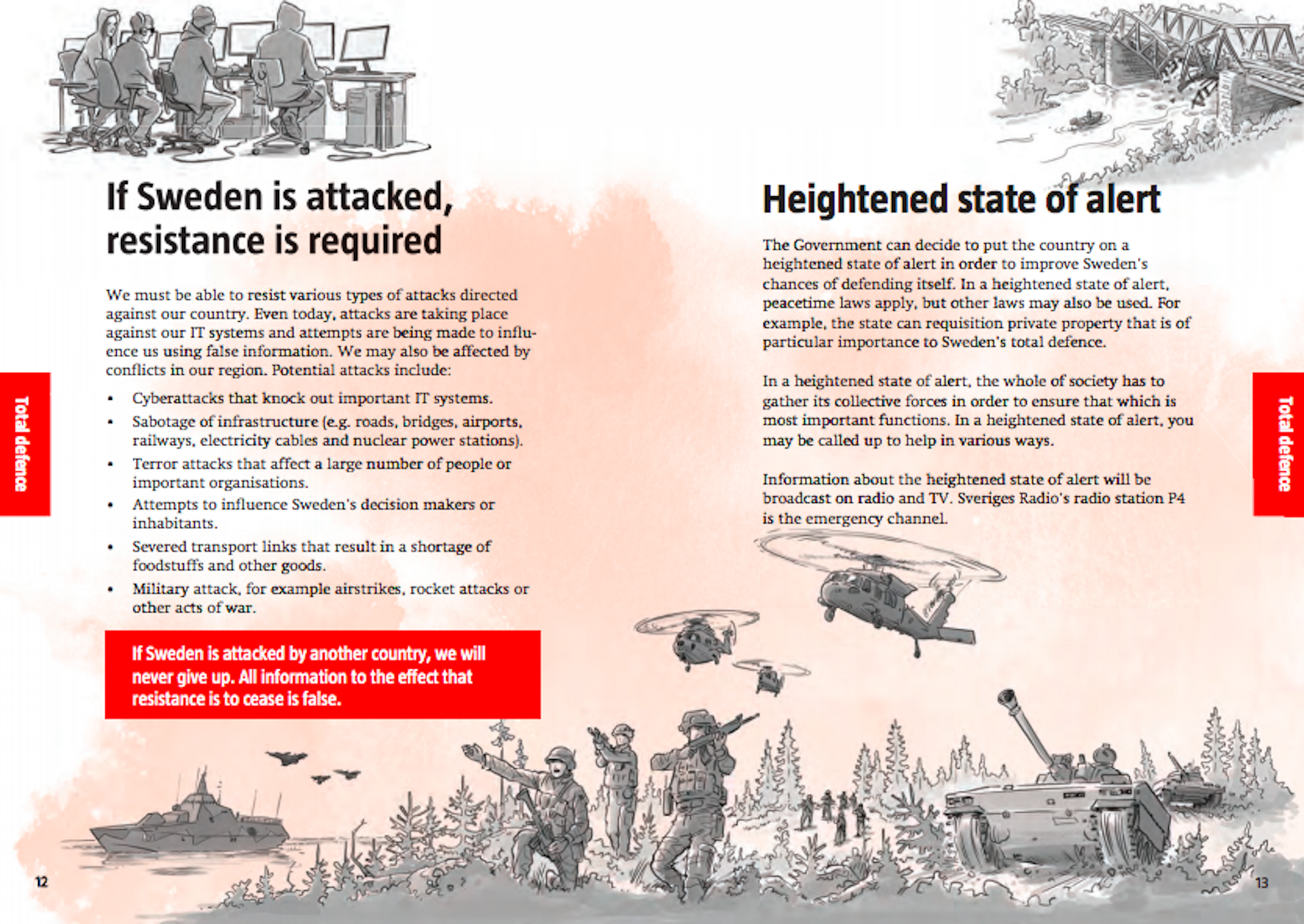(MENAFN- The Conversation) The Swedish government is sending a booklet called ' Om krisen eller kriget kommer ' (If Crisis or War Comes) to households all over the country, advising them on how to prepare for war. The 20-page document includes advice on what to do in the event of a terrorist attack, and how to prepare food and shelter in the event of conflict.
The introduction reads:
There is even a clear message that Sweden would not surrender to attack. 'If Sweden is attacked by another country,' the leaflet reads, 'we will never give up. All information to the effect that resistance is to cease is false.'

This is not, in fact, the first time this leaflet has been sent to homes in Sweden, but some key differences between print runs reflect the changing times – and also reveal what a pointless exercise this leaflet is.
Karl Marx famously compared emperor Napoleon with his nephew Louis Bonaparte by saying: 'History repeats itself: the first time as tragedy, the second time as farce.'
When the leaflet was first produced in 1943, Nazi Germany had occupied Norway and Denmark, and Finland was at war with the Soviet Union. Sweden was neutral and not at war but there was certainly tragedy in Europe. World War II was raging and the booklet stood up to the occasion. Its content appealed to the population at the time. Many saw themselves as patriots, and a substantial proportion of the men had served in the armed forces.
The booklet was updated and distributed to the citizens twice more, the last time in the year 1961. At that time, the military position of Sweden was safe. Its military defence was strong. The patriotic atmosphere from the World War II period continued, reflected in school curricula and in a plethora of active civic organisations, including the Red Cross, the Lotta female paramilitary corps , the Home Guard, Scouts, and the Shooters' organisation.
Sweden retained comparatively strong armed forces until the end of the Cold War. But in the early 21st century, the country disarmed. For all practical purposes the so-called 'civilförsvaret' – civil defence – was dismantled. In 2010, mandatory military service was abolished. By that time, most of the peacetime regiments had been disbanded.
Mandatory military service was reintroduced in Sweden in 2018. One of the regiments, the P18 in Gotland , was resurrected. And now, the leaflet is being distributed to all households.
But today, politics in some countries in Europe are reminiscent of a black farce. The same judgement must, unfortunately, be made concerning 'Om krisen eller kriget kommer'.
Reprinting for changing times
The first iteration of this leaflet was called 'If War Comes' – 'Om kriget kommer'. This was a handbook on how to behave, offering advice on being alert to potential spies. It described how to store food and water and hide in a shelter. Now, citizens are being told how to prepare for 'crisis'. The leaflet includes advice on how to deal with propaganda and asks them to think about whether they'd be able to cope if the internet and cash machines stopped working.
Crisis? What crisis? Swedish government
The title change is important to note. The dilution of 'War' into 'Crisis or War' makes the booklet sound harmless. 'Crisis' is very hard to define. The concept covers a variety of situations. And the word 'or' makes the leaflet seem to be a discussion paper and not an appeal.
The leaflet is also addressed to 'The population of Sweden', when the original was addressed to 'The citizens'. It has been translated into the official minority languages of Sweden – Finnish, Yiddish, Meänkieli (a local language spoken at the Finnish border), Romani Chib and North-, South-, and Lule-Sami – the latter three are for some reason labelled 'dialects' although they are mutually unintelligible.
The booklet is also translated into six other languages: Arabic, Dari, English, French, Persian and Russian, the speakers of which in some cases are much more numerous than those speaking Yiddish, Meänkieli, Romani Chib or Sami.
Now the booklet aims to remind not just citizens of Sweden but all who happen to live on its territory that 'everyone who lives in Sweden shares a collective responsibility for our country's security and safety'.
The appeal to 'the population' instead of to 'citizens' makes the leaflet unoperative. In 1943 and in 1961, Swedish citizens were a coherent group, a historical actor. Today, the habitants of Sweden are not addressed as citizens by the Swedish government. They live under the spell of identity politics. It is certainly nice to believe that they 'share a collective responsibility for our country's security and safety'. But this cannot be taken for granted. Today's population of Sweden comprise people who do not identify with the state, much more so than in the 1940s and 1960s.
The profound challenge for contemporary Sweden is integration, to make the 'population' into committed citizens who identify with the country. A leaflet won't achieve that goal.
Europe War Sweden Scandinavia

MENAFN2505201801990000ID1096907946
Legal Disclaimer:
MENAFN provides the information “as is” without warranty of any kind. We do not accept any responsibility or liability for the accuracy, content, images, videos, licenses, completeness, legality, or reliability of the information contained in this article. If you have any complaints or copyright issues related to this article, kindly contact the provider above.